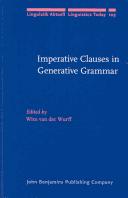| Listing 1 - 10 of 12 | << page >> |
Sort by
|
Book
ISBN: 1139950134 1139949071 0511998120 1107012341 1107632358 9781107632356 Year: 2014 Publisher: Cambridge : Cambridge University Press,
Abstract | Keywords | Export | Availability | Bookmark
 Loading...
Loading...Choose an application
- Reference Manager
- EndNote
- RefWorks (Direct export to RefWorks)
Imperative sentences usually occur in speech acts such as orders, requests, and pleas. However, they are also used to give advice, and to grant permission, and are sometimes found in advertisements, good wishes and conditional constructions. Yet, the relationship between the form of imperatives, and the wide range of speech acts in which they occur, remains unclear, as do the ways in which semantic theory should handle imperatives. This book is the first to look systematically at both the data and the theory. The first part discusses data from a large set of languages, including many outside the Indo-European family, and analyses in detail the range of uses to which imperatives are put, paying particular attention to controversial cases. This provides the empirical background for the second part, where the authors offer an accessible, comprehensive and in-depth discussion of the major theoretical accounts of imperative semantics and pragmatics.
Grammar, Comparative and general --- Imperative (Grammar) --- Jussive (Grammar) --- Imperative. --- Mood --- Verb --- Linguistics --- Philology
Book
ISBN: 9780199207909 0199207909 Year: 2010 Publisher: Oxford: Oxford university press,
Abstract | Keywords | Export | Availability | Bookmark
 Loading...
Loading...Choose an application
- Reference Manager
- EndNote
- RefWorks (Direct export to RefWorks)
Grammar, Comparative and general --- Imperative --- Imperative. --- Linguistics --- 801.56 --- 801.56 Syntaxis. Semantiek --- Syntaxis. Semantiek --- Imperative (Grammar) --- Jussive (Grammar) --- Mood --- Verb --- Philology --- Grammar, Comparative and general - Imperative
Book
ISBN: 1283576503 9786613888952 0191548928 9780191548925 9780199207909 0199207909 Year: 2010 Publisher: Oxford Oxford University Press
Abstract | Keywords | Export | Availability | Bookmark
 Loading...
Loading...Choose an application
- Reference Manager
- EndNote
- RefWorks (Direct export to RefWorks)
This is the first cross-linguistic study of imperatives, and commands of other kinds, across the world's languages. It makes a significant and original contribution to the understanding of their morphological, syntactic, semantic, and pragmatic characteristics. The author discusses the role imperatives and commands play in human cognition and how they are deployed in different cultures, and in doing so offers fresh insights on patterns of human interaction and communcation.Alexandra Aikhenvald examines the ways of framing commands, or command strategies, in languages that do not have special i
Grammar, Comparative and general --- Language and languages --- Grammar --- Grammar, Polyglot --- Polyglot grammar --- Imperative (Grammar) --- Jussive (Grammar) --- Imperative. --- Grammars. --- Mood --- Verb --- Linguistics --- Philology
Book
ISBN: 9780198733270 9780198733263 0198733267 0198733275 0191797790 Year: 2015 Publisher: Oxford Oxford University Press
Abstract | Keywords | Export | Availability | Bookmark
 Loading...
Loading...Choose an application
- Reference Manager
- EndNote
- RefWorks (Direct export to RefWorks)
This book studies the properties of imperative clauses in the context of a theory of Universal Grammar. Daniela Isac argues that the specificity of imperative clauses cannot be the result of a unique imperative Force feature; instead, the 'type' of imperative clauses can be traced back to a plurality of finer grained features, such as Modality and phi-features, hosted by the Mod, Infl, and Speech Event heads, among others. The data are drawn from a wide range of languages including various Romance, Slavic, and Germanic languages, as well as Finnish and Inuktitut. The analysis accounts for recurrent patterns in the interaction of imperative mood with phenomena like negation, restrictions on grammatical subjects, and the possibility of embedding imperative clauses. The approach, which focuses exclusively on morphosyntactic rather than semantic features, is potentially transferable to the analysis of other clause types, such as exclamatives, interrogatives, and declaratives.
Grammar --- Grammar, Comparative and general --- Morphosyntax. --- Imperativ. --- Formlära (språkvetenskap) --- Imperative. --- Morphology. --- Formlära (språkvetenskap). --- Morphology (Linguistics) --- Imperative (Grammar) --- Jussive (Grammar) --- Morphosyntactic features --- Morphosyntax --- Imperative --- Morphology --- Mood --- Verb --- Syntax --- Linguistics --- Philology --- Grammar, Comparative and general Morphology

ISBN: 9789027233677 9027233675 9786612152955 1282152955 9027292310 9789027292315 9781282152953 6612152958 Year: 2007 Publisher: Amsterdam Philadelphia J. Benjamins Pub.
Abstract | Keywords | Export | Availability | Bookmark
 Loading...
Loading...Choose an application
- Reference Manager
- EndNote
- RefWorks (Direct export to RefWorks)
This volume contains ten articles exploring a wide range of issues in the analysis of the imperative clause from a generative perspective. The language data investigated in detail in the articles come from Dutch, English, German, (old) Scandinavian, Spanish, and South Slavic; there is further significant discussion of data from other Germanic and Romance languages. The phenomena addressed (in several cases in more than one article, leading to some lively debate about contentious issues) include the following: the nature and interpretation of imperative subjects; the properties of participial imperatives; clitic behavior; restrictions on topicalization; word order; null arguments; negative imperatives; and imperatives in embedded clauses. The volume has a substantial introduction, sketching the results of earlier generative work on the topic (most of it scattered across disparate outlets), the issues left open by this earlier work, and the contribution to further insight and understanding made by the book's articles.
Generative grammar. --- Grammar, Comparative and general --- Clauses. --- Imperative. --- Generative grammar --- Imperative (Grammar) --- Jussive (Grammar) --- Clauses --- Grammar, Generative --- Grammar, Transformational --- Grammar, Transformational generative --- Transformational generative grammar --- Transformational grammar --- Psycholinguistics --- Imperative --- Mood --- Verb --- Sentences --- Syntax --- Derivation --- Linguistics --- Philology
Book
ISBN: 9781107005808 9780511794391 9781139870672 113987067X 1139862820 9781139862820 0511794398 1139864963 9781139864961 1107005809 1139698567 9781139698566 1139861565 9781139861564 1139860682 9781139860680 1139868543 9781139868549 Year: 2014 Volume: 140 Publisher: Cambridge : Cambridge University Press,
Abstract | Keywords | Export | Availability | Bookmark
 Loading...
Loading...Choose an application
- Reference Manager
- EndNote
- RefWorks (Direct export to RefWorks)
The imperative clause is one of three major sentence types that have been found to be universal across the languages of the world. Compared to declaratives and interrogatives, the imperative type has received diverse analyses in the literature. This cutting-edge study puts forward a new linguistic theory of imperatives, arguing that categories of the speech act, specifically Speaker and Addressee, are conceptually necessary for an adequate syntactic account. The book offers compelling empirical and descriptive evidence by surveying new typological data in critical assessment of competing hypotheses towards an indexical syntax of human language. An engaging read for students and researchers interested in linguistics, philosophy and the syntax of language.
Grammar, Comparative and general --- Language and languages --- Syntax --- Imperative (Grammar) --- Jussive (Grammar) --- Grammar --- Grammar, Polyglot --- Polyglot grammar --- Imperative --- Grammars --- Mood --- Verb --- Imperative. --- Syntax. --- Grammars. --- Arts and Humanities --- Language & Linguistics --- Linguistics --- Philology --- Grammar, Comparative and general Syntax
Book
ISBN: 9400722680 9786613456311 1283456311 9400722699 Year: 2012 Publisher: Dordrecht [The Netherlands] : Springer,
Abstract | Keywords | Export | Availability | Bookmark
 Loading...
Loading...Choose an application
- Reference Manager
- EndNote
- RefWorks (Direct export to RefWorks)
Imperative clauses are recognized as one of the major clause types alongside those known as declarative and interrogative. Nevertheless, they are still an enigma in the study of meaning, which relies largely on either the concept of truth conditions or the concept of information growth—neither of which are easily applied to imperatives. This book puts forward a fresh perspective. It analyzes imperatives in terms of modalized propositions, and identifies an additional, presuppositional, meaning component that makes an assertive interpretation inappropriate. The author shows how these two elements can help explain the varied effects imperatives have, depending on their usage context. Imperatives have been viewed as elusive components of language because they have a range of functions that makes them difficult to unify theoretically. This fresh view of the semantics-pragmatics interface allows for a uniform semantic analysis while accounting for the pragmatic versatility of imperatives. .
Grammar, Comparative and general -- Clauses. --- Grammar, Comparative and general -- Imperative. --- Language and languages -- Imperative. --- Grammar, Comparative and general --- Language and languages --- Languages & Literatures --- Philology & Linguistics --- Imperative --- Clauses --- Imperative. --- Clauses. --- Imperative (Grammar) --- Jussive (Grammar) --- Linguistics. --- Semantics. --- Philosophy of Language. --- Philosophy. --- Sentences --- Syntax --- Mood --- Verb --- Linguistics --- Formal semantics --- Semasiology --- Semiology (Semantics) --- Comparative linguistics --- Information theory --- Lexicology --- Meaning (Psychology) --- Language and languages—Philosophy.

ISBN: 0815337876 Year: 2000 Publisher: New York Garland
Abstract | Keywords | Export | Availability | Bookmark
 Loading...
Loading...Choose an application
- Reference Manager
- EndNote
- RefWorks (Direct export to RefWorks)
Grammar, Comparative and general --- Speech acts (Linguistics) --- Illocutionary acts (Linguistics) --- Speech act theory (Linguistics) --- Speech events (Linguistics) --- Language and languages --- Linguistics --- Speech --- Negatives (Grammar) --- Mode (Grammar) --- Mood (Grammar) --- Interrogative (Grammar) --- Questions and answers (Linguistics) --- Imperative (Grammar) --- Jussive (Grammar) --- Imperative --- Interrogative --- Mood --- Negatives --- Philosophy --- Verb --- Grammar --- Philology
Book
ISBN: 0631151931 9780631151937 Year: 1987 Publisher: Oxford: Blackwell,
Abstract | Keywords | Export | Availability | Bookmark
 Loading...
Loading...Choose an application
- Reference Manager
- EndNote
- RefWorks (Direct export to RefWorks)
English language --- Grammar --- Semantics (Philosophy) --- Grammar, Comparative and general --- Commands (Logic) --- Imperative --- -Semantics (Philosophy) --- Intension (Philosophy) --- Logical semantics --- Semantics (Logic) --- Semeiotics --- Significs --- Syntactics --- Unified science --- Language and languages --- Logic, Symbolic and mathematical --- Logical positivism --- Meaning (Psychology) --- Philosophy, Modern --- Semiotics --- Signs and symbols --- Symbolism --- Analysis (Philosophy) --- Definition (Philosophy) --- Comparative grammar --- Grammar, Philosophical --- Grammar, Universal --- Philosophical grammar --- Linguistics --- Philology --- Imperatives (Logic) --- Logic --- Grammar, Comparative --- Imperative (Grammar) --- Jussive (Grammar) --- Mood --- Verb --- Grammar, Comparative and general - Imperative
Book
ISSN: 18793983 ISBN: 9789027226402 9027226407 9789027265524 9027265526 Year: 2017 Volume: 30 Publisher: Amsterdam: John Benjamins,
Abstract | Keywords | Export | Availability | Bookmark
 Loading...
Loading...Choose an application
- Reference Manager
- EndNote
- RefWorks (Direct export to RefWorks)
Grammar, Comparative and general --- Discourse analysis. --- Pragmatics. --- Speech acts (Linguistics) --- Illocutionary acts (Linguistics) --- Speech act theory (Linguistics) --- Speech events (Linguistics) --- Language and languages --- Linguistics --- Speech --- Pragmalinguistics --- General semantics --- Logic, Symbolic and mathematical --- Semantics (Philosophy) --- Discourse grammar --- Text grammar --- Semantics --- Semiotics --- Syntax --- Imperative (Grammar) --- Jussive (Grammar) --- Imperative. --- Syntax. --- Philosophy --- Mood --- Verb --- Discourse analysis --- Pragmatics --- Imperative --- Speech acts (Linguistics). --- Philology --- Grammar, Comparative and general - Imperative --- Grammar, Comparative and general - Syntax --- Grammar, Comparative and general Syntax
| Listing 1 - 10 of 12 | << page >> |
Sort by
|

 Search
Search Feedback
Feedback About UniCat
About UniCat  Help
Help News
News